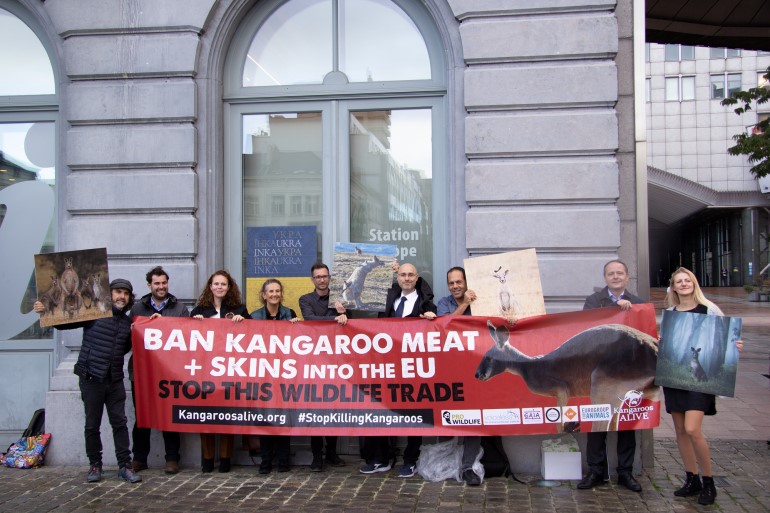The increase in the number of kangaroos in Australia because of weather conditions has sparked a debate about allowing massive hunting of the animals to manage the number of the population and save the remaining animals from starving to death.
As previously reported, some experts in Australia argue that the best solution to an estimated huge increase in the number of kangaroos in the tens of million in the near future would be to kill the excess number which cannot survive in times of drought and export the meat and leather.
But other experts and animal welfare organisations in Brussels disagree with this approach. “There is no proof that there are more kangaroos today than in the past,” Dr Dror Ben-Ami, an Israeli-Australian zoologist and co-founder and associate researcher at the Centre for Compassionate Conservation, University of Technology Sydney, told The Brussels Times.
“Kangaroo populations typically oscillate in boom-and-bust cycles in response to rainfall events,” he explains. “In fact, rainfall and subsequent available food is known to be the primary determinant of kangaroo populations, not predation (killing by other animals) or commercial killing.”
He cautions that estimates should be taken with a grain of salt. “In some locations populations have recently declined dramatically, as evidenced by public records submitted to the New South Wales (NSW) Inquiry into the Health and Well-Being of Kangaroos. The inquiry determined that the population estimate methodology should be transparent and subject to external assessment.
Furthermore, the killing of kangaroos in the wild for their own good interferes with ecological processes. “A good analogy are the wildebeest in the Serengeti National Park, Tanzania, that migrate in vast numbers and are not killed for their own good. The kangaroo carcasses are devoured by predators and scavengers and their nutrients return to the soil.”
“The suggestion that commercial killing of kangaroos will decrease the population is misleading,” he concluded. “This is because commercial killing has to abide by sustainable quotas.”
“Europeans have no concept about the droughts which beset us for years after years,” an Australian who emigrated from Brussels commented. “Kangaroos leave their bush habitat when depleted of verdure and take over pastoral land, they rip out the tufts of grass to the inclusion of the roots, thus no future fodder when the rain does eventually come.”
That explains, according to the source, culling expeditions by farmers. To his knowledge, there is no excess of kangaroo meat to consider for large export. In his view, the meat can be fit for human consumption if it is based on selective killings.
“The kangaroo industry is threatened on several fronts,” commented Léa Badoz, Programme Officer Wildlife, Eurogroup for Animal. “This makes us question whether its call to allow massive killing of kangaroos is not a desperate move from the industry to try and convince the public that they are saving kangaroos.”
“This is a business, there is no ethical justification to this. In the present case, no thorough assessment has been conducted concluding that it is necessary to kill kangaroos. In addition, culling should be a last resort after all alternative measures have been put in place and failed. We are far from such a situation; this is simply an industry trying to greenwash their cruel business.”
Last year, she was one of three petitioners to the European Parliament's Committee on Petitions (PETI) calling for an end to the import of kangaroo meat, leather and all other products derived from that animal, on three grounds: animal welfare, species conservation and public health.
“Kangaroo hunting, which is carried out at night, causes serious ethical and animal welfare problems. The annual quotas for commercial hunting are based on gross overestimates, which is endangering a number of kangaroo species. High levels of Salmonella and E.coli have been found in kangaroo meat for human consumption in Australia,” according to the petition.
Som major brands like Nike and Puma have already announced that they are phasing out production of shoes made of kangaroo leather in response to public ethical concerns about the killing of kangaroos and the availability of suitable alternative material. Eurogroup for Animals are now asking Adidas to do the same.
M. Apelblat
The Brussels Times

